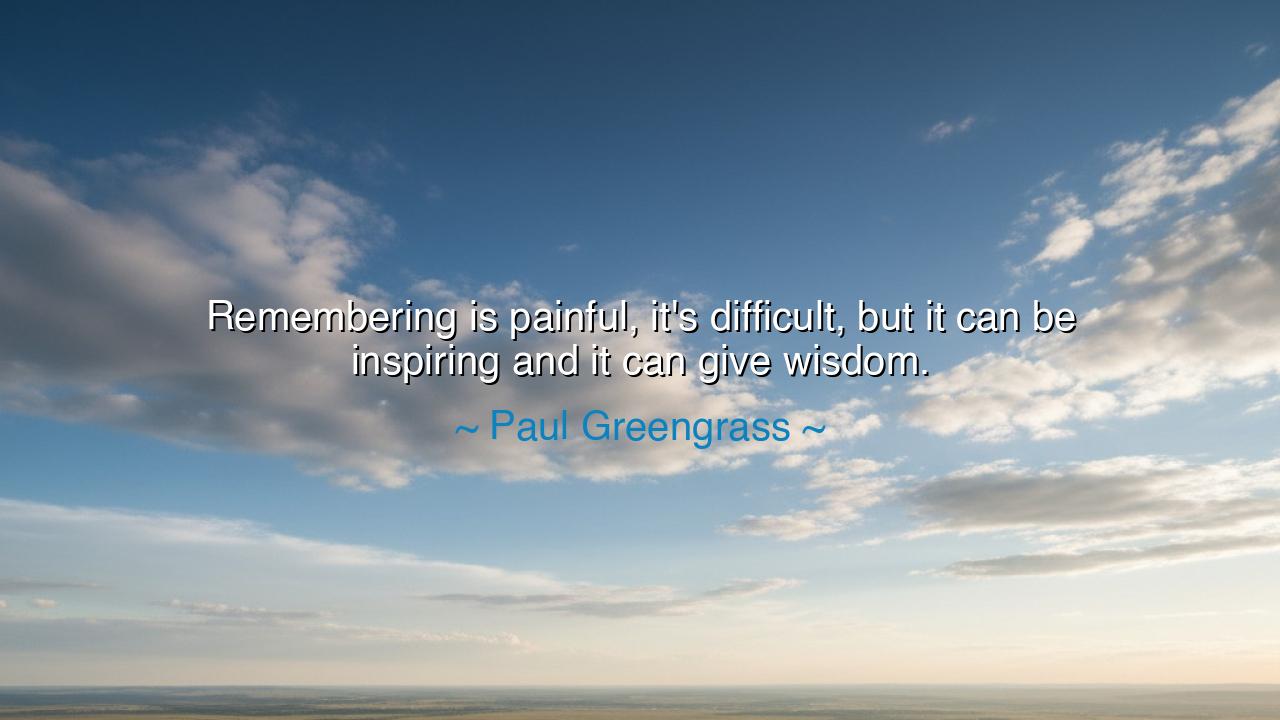
Remembering is painful, it's difficult, but it can be inspiring
Remembering is painful, it's difficult, but it can be inspiring and it can give wisdom.






Hearken, O children of reflection, to the solemn counsel of Paul Greengrass, who speaks of the paradoxical power of remembering. He declares that the act of recalling the past is often painful and difficult, for the mind must confront sorrows, regrets, and the shadows of times gone by. Yet within this challenge lies a hidden blessing: memory, though heavy with grief, may become inspiring, guiding the soul toward understanding, growth, and the illumination of wisdom.
The origin of this reflection lies in Greengrass’ life as a filmmaker and chronicler of human experience, where the preservation of memory—particularly of tragedy and human suffering—serves not to linger in despair, but to cultivate insight and moral reflection. Through the act of remembering, individuals and societies confront the truths of history, learning lessons that shape actions, decisions, and the very character of generations to come.
The meaning of this aphorism is profound: to look upon past events with courage is to engage in a sacred labor of the mind and heart. Memory awakens understanding, teaching the lessons that ignorance and forgetfulness would conceal. Though the act of remembering may wound, it also nurtures resilience, insight, and the capacity to act with foresight. Wisdom emerges when the mind embraces the truths of the past, even those that ache.
History provides luminous testimony to this teaching. Consider Elie Wiesel, who endured the horrors of the Holocaust and dedicated his life to remembering those atrocities. His recollections, though searing and painful, became a beacon of moral reflection and wisdom, inspiring generations to confront hatred, injustice, and indifference with vigilance and courage. In his example, memory becomes both burden and blessing, suffering transmuted into enduring guidance.
Moreover, this teaching extends beyond the extraordinary to everyday life. The recollection of mistakes, losses, and personal trials offers the individual an opportunity to cultivate insight, temper pride, and act with prudence. Greengrass reminds us that the heart and mind, when willing to endure the difficulty of reflection, may extract lessons that illuminate future paths and enrich the soul with depth, empathy, and clarity.
O generations yet unborn, take this counsel into your hearts: do not shy from the pain of remembering, for within it lies the seed of inspiration and the gift of wisdom. Let memory be both teacher and guide, shaping your deeds, strengthening your spirit, and illuminating the path through the trials of life. In this alchemy of reflection, sorrow becomes insight, and remembrance transforms the human soul.






BNDo Binh Nhi
I appreciate the honesty in this quote. It reminds me that remembering isn’t just nostalgia; it’s often an act of courage. Yet, not everyone finds inspiration in pain—some get stuck in it. So how can we ensure that remembering leads to wisdom instead of bitterness? Perhaps it depends on how we frame the story of our past—whether we see ourselves as victims or as survivors who learned something valuable.
CVChi Vu
There’s a quiet truth in this statement that I really admire. It suggests that memory isn’t just emotional but transformative. Still, I wonder—why does remembering hurt so much if it’s supposed to bring wisdom? Maybe because true understanding requires vulnerability. You can’t gain insight without revisiting the wounds that shaped you. It’s almost paradoxical: to heal, we have to be willing to reopen old scars.
VANguyen Ngoc Van Anh
This makes me think about how societies remember collective pain—like wars, injustices, or tragedies. Remembering is indeed difficult, but without it, we risk repeating the same mistakes. How do we balance honoring the past without being defined by it? I’d love to know how filmmakers like Greengrass, who often deal with real historical trauma, navigate the fine line between evoking pain and inspiring hope.
KVKhanh Vo
I find this perspective incredibly human. It acknowledges that reflection isn’t always pleasant, but it’s necessary for transformation. Still, I’m curious—how do we turn painful memories into something constructive instead of letting them consume us? Is the difference simply a matter of perspective, or does it require time, forgiveness, and deliberate emotional work? It’s a reminder that wisdom often has a cost attached to it.
TTdo thi thom
This quote really resonates with me because it captures the dual nature of memory—how it can hurt yet heal at the same time. It makes me wonder, though, how we decide which memories to confront and which to let go of. Is there wisdom in forgetting as much as there is in remembering? Maybe growth comes from knowing when to face the past and when to move beyond it.